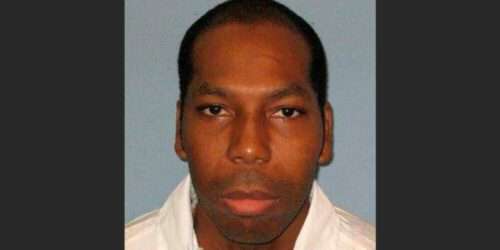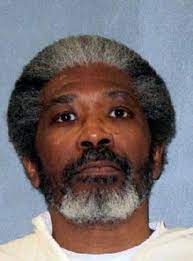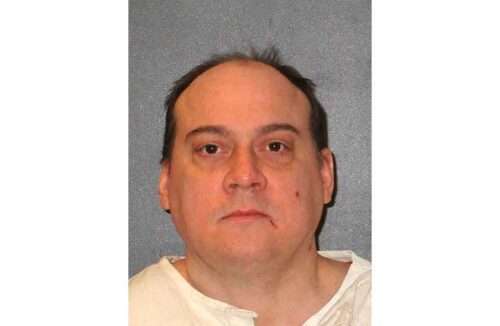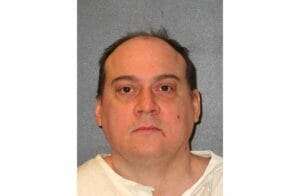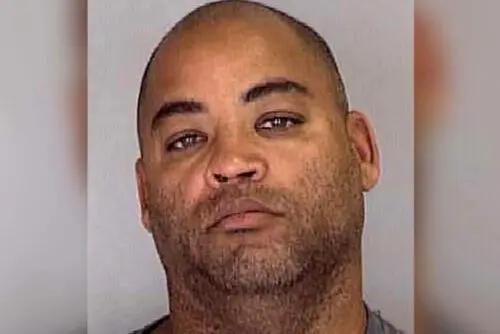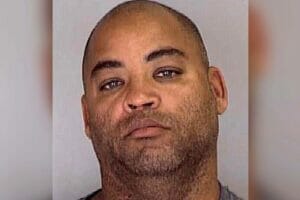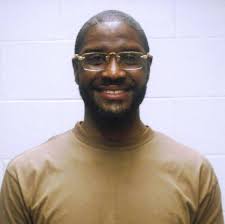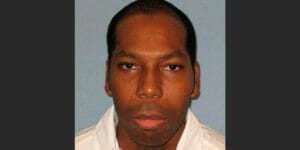
Domineque Ray was executed by the State of Alabama for the murder of a teenage girl. According to court documents Domineque Ray would stab to death Tiffany Harville. Domineque Ray was also serving multiple life sentences for murdering two teenage boys the year before Tiffany Harville murder. Domineque Ray would be executed by lethal injection on February 7, 2019
Domineque Ray More News
Alabama has executed Domineque Hakim Marcelle Ray for the 1995 slaying of a 15-year-old Selma girl, after the U.S. Supreme Court lifted a federal appeals court stay based on the inmate’s request to have his Muslim spiritual adviser at his side when he dies.
Ray’s execution by lethal injection was set for 6 p.m. at Holman Correctional Facility in Atmore. The U.S. Supreme Court lifted the stay about 8 p.m., and the execution began at 9:44 p.m.
The curtains to the viewing room closed at 10:05 p.m, and the official time of death was 10:12 p.m.
His execution comes 20 years after being put on death row, and while he was also serving time for the killings of two teenage boys who were slain the year before Tiffany Harville was fatally stabbed. For the boys’ killings, he was sentenced to life in prison.
Ray’s last words were in Arabic. He made a hand signal consisting of a closed fist with his index finger pointed and looked toward the viewing room where two of his attorneys and spiritual adviser were sitting, along with members of the media.
No representatives of the victim’s family attended.
Several minutes after the execution began, Ray lifted his head and looked at his arm. When a correctional officer performed a consciousness check a few minutes later, Ray did not respond.
One of Ray’s attorneys from the Federal Defenders of the Middle District of Alabama, Spencer Hahn, said after the execution, “Domineque was a devout Muslim and a human being. He was a son, a father, a brother. He wanted equal treatment in his last moments. I am beyond appalled at the willingness of Steve Marshall and the State of Alabama to treat a human being differently because he was part of a religious minority. We are better than this.”
ADOC Commissioner Jeff Dunn said after the execution that the department is prepared to carry out more executions this year. When asked if the department would be changing their protocol to exclude chaplains of any faith from the execution chamber, as mentioned in an earlier court filing, Dunn said currently the ADOC “has not made any changes to the formal protocol.”
Dunn also said the department “relies very heavily” on volunteer chaplains who visit the prison, but the ADOC hires chaplains based on a state registry.
Alabama Attorney General Steve Marshall issued a statement after the execution: “For 20 years, Domineque Ray has successfully eluded execution for the barbaric murder of a 15-year-old Selma girl. In 1995, Ray brutally deprived young Tiffany Harville of her life, repeatedly stabbing and raping her before leaving her body in a cotton field. A jury gave him a death sentence for this heinous crime. A year before, Ray had also taken the lives of two teenage brothers, Reinhard and Earnest Mabins. Tonight, Ray’s long-delayed appointment with justice is finally met.”
The U.S. Supreme Court lifted the stay of execution after voting 5-4 in favor of the state. Justices Elena Kagan, Ruth Bader Ginsburg, Stephen Breyer, and Sonia Sotomayor dissented.
Kagan issued a dissenting opinion. “Under [the state’s] policy, a Christian prisoner may have a minister of his own faith accompany him into the execution chamber to say his last rites. But if an inmate practices a different religion— whether Islam, Judaism, or any other — he may not die with a minister of his own faith by his side. That treatment goes against the Establishment Clause’s core principle of denominational neutrality,” she wrote.
The opinion states, “Here, Ray has put forward a powerful claim that his religious rights will be violated at the moment the State puts him to death. The Eleventh Circuit wanted to hear that claim in full. Instead, this Court short-circuits that ordinary process — and itself rejects the claim with little briefing and no argument — just so the State can meet its preferred execution date.”
At approximately 6:30 p.m., ADOC Spokesperson Bob Horton said Ray was visited Wednesday by his uncle, brother, sister-in-law, attorney, and Muslim spiritual adviser. Thursday, he was visited by two attorneys and his spiritual adviser. Also on Thursday, Ray made calls to family members and attorneys.
For breakfast, he had milk, eggs, jelly, prunes, two biscuits, and potatoes. Ray refused the last meal of the day. He made a special request to have his spiritual adviser, or imam, in the execution chamber.
In his final days, Ray was at the center of several legal battles.
An appeal and motion for a stay of execution was filed to the U.S. Supreme Court after the U.S. 11th Circuit Court of Appeals granted Ray a stay of execution on Wednesday. Both Ray’s attorneys and the Alabama Attorney General’s Office filed several briefs throughout the day Thursday, before the court ultimately made their ruling just after 8 p.m.
Ray’s attorneys filed a federal lawsuit last week claiming Ray’s religious freedom was being violated because the Alabama Department of Corrections would not allow his imam to be in the execution chamber. Officials told Ray he would be allowed to meet with his imam up until being prepared for execution, the lawsuit claims, but the imam would have to watch the execution in a witness room with two-way glass. The ADOC also said they wouldn’t remove the Christian chaplain who is typically in the execution chamber.
Horton said the department follows protocol “regardless of the chaplain’s spiritual belief or that of the inmate.” Horton said the ADOC protocol “only allows approved correctional officials, that includes the prison’s chaplain, to be inside the chamber where executions are lawfully carried out. The inmate’s spiritual adviser may visit the inmate beforehand and witness the execution from a designated witness room that has a two-way window.”
Chief U.S. District Judge Keith Watkins of the Middle District of Alabama held a hearing last Thursday and issued an order the next day denying the stay of execution.
Ray’s lawyers from the Federal Defenders for the Middle District of Alabama appealed Watkins’ ruling to the 11th Circuit Court of Appeals, and Wednesday the appeals court vacated Watkins’ ruling and issued a stay of execution, writing in its order: “Notably, Alabama did not provide the Court with any affidavit from the Warden or from any other prison official addressing in any way why there were not lesser measures available to protect its interests and provide the same faith-based benefits to Christians and non-Christians alike. Nor did Alabama offer anything from its Chaplain or from anyone else about the perceived risks or the things that a cleric might need to learn in order to undertake this solemn and sensitive task. Alabama has presented us with nothing in support of its claims.”
The appeals court noted in its order that the clerk should “expedite” the appeal “so that we may promptly resolve these claims.”
The Alabama Attorney General’s Office appealed that ruling to the U.S. Supreme Court on Wednesday afternoon. They said in their motion to the nation’s top court that the 11th Circuit “missed the mark.” The filing said, “It was bad enough that the court amended Ray’s pleadings for him. But worse still is that the court’s Establishment Clause analysis and proposed remedy make no sense. The Eleventh Circuit’s holding that the State had favored one denomination over another might make sense if the State allowed only Christians to bring their preferred spiritual advisers into the execution chamber, but the State forbids anyone who is not employed by ADOC into the execution chamber.”
Attorneys for the ADOC said while they wouldn’t allow Ray’s imam to be in the execution chamber, as he isn’t an ADOC employee, they would allow Ray to expel the chaplain from the room. The judge granted Ray’s request in his order that the ADOC must remove the chaplain from the execution chamber, and make sure he can’t be seen by Ray during the procedure.
The inmate’s volunteer Muslim imam, Yusef Maisonet, said there are prayers required of a Muslim before he dies and that Ray needs his assistance to die honoring his faith.
“I know the things that are required of Muslims before they die,” Maisonet, imam of Masjid As Salaam in Mobile, told AL.com. “We want to make sure his last words are, ‘There is no God but God, and Muhammad is his prophet.’”
Maisonet said he would also read Ray verses from the Quran, the holy book of Islam, so that those are the last words Ray hears. “As he’s going through his transition, I can read from the Quran, and he can leave with that on his spirit,” Maisonet said
Ray was given access to a Quran on Thursday after his lawyers argued in a Wednesday filing that the inmate spent two nights without it. Ahead of a scheduled execution, the ADOC moves a condemned inmate to a cell near the execution chamber, called a death watch cell. According to the filing, Ray was without his Quran since being moved into that cell on Tuesday.
The attorneys also asked for Ray to be executed by nitrogen hypoxia, a newly approved method of execution in the state. There are more than 50 death row inmates who have chosen to die by the new method, but they made their elections by the June 2018 deadline implemented by the state. According to Watkins’ order, Ray claimed to have waited until January to make his election because in June, Ray’s religious beliefs hindered him from choosing the nitrogen hypoxia method.
Watkins dismissed Ray’s nitrogen hypoxia request.
Dunn said Thursday night the ADOC is working with the AG’s Office to develop a protocol for executions by nitrogen hypoxia, but has no timeline on when that protocol might be finalized and ready to implement.
The AG’s Office described Harville’s killing in a recent federal court filing: “On a midsummer evening in 1995, fifteen-year-old Tiffany Harville was taken to a cotton field outside of Selma, Alabama, by Dominique Ray and Marcus Owden. Regrettably, Tiffany did not know what sort of person Ray was. If she had known that Ray and Owden had previously murdered thirteen-year-old Reinhard Mabins and his eighteen-year-old brother Earnest, then perhaps the horrific events that occurred in that cotton field could have been avoided. But she did not know, and that night, Ray and Owden raped Tiffany and stabbed her repeatedly as she cried out her final prayer: ‘God, help me.’ Then they left her abused body in that cotton field, where her bones would be found almost a month later.”
Previous court documents said Harville’s throat was also cut and that when her body was found off County Road 62 by a farmer, the teen’s purse with approximately $6 was missing and her underwear was gone.
The case went unsolved for over two years, before Owden talked to police in 1997 after experiencing a “spiritual awakening,” court records state. He implicated himself and Ray in the crime, and Ray was arrested shortly after. He was convicted in 1999.
Owden pleaded guilty to the slaying and testified at Ray’s trial, where records state he detailed the “raw brutal” sexual abuse the men inflicted on Harville before stabbing her in the head and slashing her throat. Owden is currently serving a sentence of life in prison without parole at William Donaldson Correctional Facility.
Records state Earnest and Reinhard Mabins were shot to death inside their home on February 4, 1994, because they refused to join a gang with Ray and Owden. Owden confessed to the Mabins killings at the same time he confessed to his role in the Harville case. In February 1999, several months before the Harville trial, Ray was convicted of capital murder for the Mabins brothers’ deaths and was sentenced to life in prison.
Owden’s testimony at the Harville trial was the focus of Ray’s appeal at the state level. Court records say Owden was “suffering from serious mental illness, including schizophrenia with hallucinations and delusions, at and before the time of Ray’s trial, rendering Owden an unreliable witness.” That appeal was filed last year, because attorneys said in the complaint they had just learned of Owden’s medical history.
That appeal was dismissed by a Dallas County judge, and Owden’s attorneys also appealed that case to the U.S. Supreme Court.
